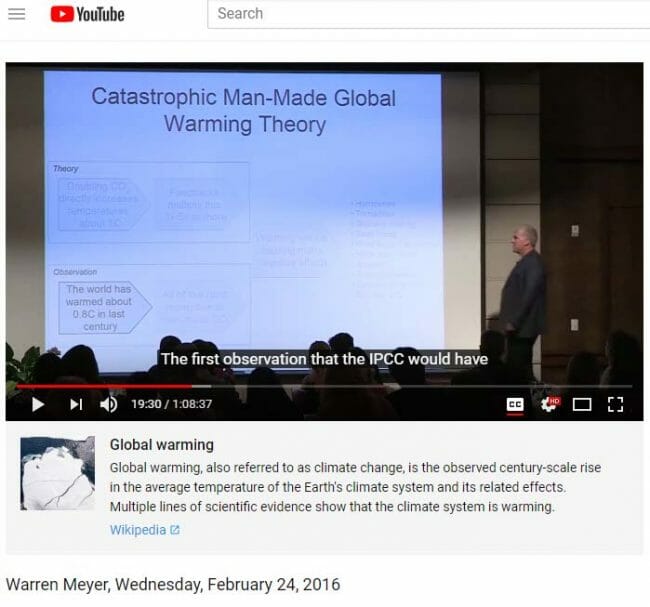Well, I got dis-invited yet again from giving my climate presentation. I guess I should be used to it by now, but in this case I had agreed to actually do the presentation at my own personal expense (e.g. no honorarium and I paid my own travel expenses). Since I was uninvited 2 days prior to the event, I ended up eating, personally, all my travel expenses. There are perhaps folks out there in the climate debate living high off the hog from Exxon or Koch money, but if so that is definitely not me, so it came out of my own pocket. I have waited a few days after this happened to cool off to make a point about the state of public discourse without being too emotional about it.
I don't want to get into the details of my presentation (you can see it here at Claremont-McKenna College) but it is called "Understanding the Climate Debate: The Lost Middle Ground" (given the story that follows, this is deeply ironic). The point of the presentation is that there is a pretty mainstream skeptic/lukewarmer position that manmade warming via greenhouse gasses is real but greatly exaggerated. It even suggests a compromise legislative approach implementing a carbon tax offset by reductions in some other regressive tax (like payroll taxes) and accompanied by a reduction in government micro-meddling in green investments (e.g. ethanol subsidies, solyndra, EV subsidies, etc).
I am not going to name the specific group, because the gentleman running the groups' conference was probably just as pissed off as I at the forces that arrayed themselves to have me banned from speaking. Suffice it to say that this is a sort of trade group that consists of people from both private companies and public agencies in Southern California.
Attentive readers will probably immediately look at the last sentence and guess whence the problem started. Several public agencies, including the City of Los Angeles, voiced EXTREME displeasure with my being asked to speak. The opposition, particularly from the LA city representative, called my presentation "the climate denier workshop" [ed note: I don't deny there is a climate] and the organizer who invited me was sent flat Earth cartoons.
Now, it seems kind of amazing that a presentation that calls for a carbon tax and acknowledges 1-1.5 degrees C of man-made warming per century could be called an extremist denier presentation. But here is the key to understand -- no one who opposed my presentation had ever bothered to see it. This despite the fact that I sent them both a copy of the CMC video linked above as well as this very short 4-page summary from Forbes. But everyone involved was more willing to spend hours and hours arguing that I was a child of Satan than they were willing to spend 5-minutes acquainting themselves with what I actually say.
In fact, I would be willing to bet that the folks who were most vociferous in their opposition to this talk have never actually read anything from a skeptic. It is a hallmark of modern public discourse that people frequently don't know the other side's argument from the other side itself, but rather from its own side (Bryan Caplan, call your office). This is roughly equivalent to knowing about Hillary Clinton's policy positions solely from listening to Rush Limbaugh. It is a terrible way to be an informed adult participating in public discourse, but unfortunately it is a practice being encouraged by most universities. Nearly every professor is Progressive or at least left of center. Every speaker who is not left of center is banned or heckled into oblivion. When a speaker who disagrees with the Progressive consensus on campus is let through the door, the university sponsors rubber rooms with coloring books and stuffed unicorns for delicate students. There are actually prominent academics who argue against free speech and free exchange of diverse ideas on the theory that some ideas (ie all the ones they disagree with) are too dangerous be allowed a voice in public. Universities have become cocoons for protecting young people from challenging and uncomfortable ideas.
I will take this all as a spur to do a next generation video or video series for YouTube -- though YouTube has started banning videos not liked by the Left, there is still room there to have a public voice. I just bought a nice new microphone so I guess it is time to get to work. I am presenting in Regina next week (high 22F, yay!) but after that I will start working on a video.
Postscript: You know what this reminds me of? Back when I was a kid, forty years ago growing up in Texas, from time to time there would be a book-banning fight in the state. Perhaps there still are such fights. Generally some religious group will oppose a certain classic work of literature because it taught some bad moral lesson, or had bad words in it, or something. But you know what often became totally clear in such events? That the vast vast majority of the offended people had not actually read the book, or if they had, they could not remember any of it. They were participating because someone else on their side told them they should be against the book, probably also someone else who had never even read the thing. But I don't think that was the point. The objective was one of virtue-signalling, to reinforce ties in their own tribe and make it clear that they did not like some other tribe. At some point the content of the book became irrelevant to how the book was perceived by both tribes -- which is why I call this "post-modern" in my title.
